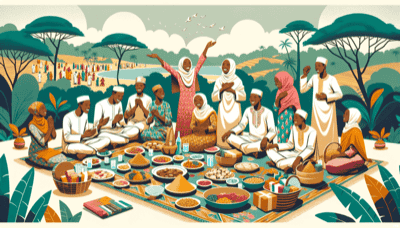We're here to help you keep count of the days to or since a date. Just click the button below and enter your chosen date to get started. Also choose the suggested days or search for a special day above #countingthedays

Eid al-Fitr, known as the "Festival of Breaking the Fast," is an important religious holiday celebrated by Muslims worldwide, marking the end of Ramadan, the Islamic holy month of fasting. While Gabon is a predominantly Christian country, it has a Muslim minority who observe Eid al-Fitr.
The history of Eid in Gabon reflects the broader spread of Islam into West and Central Africa over several centuries. The traditions observed during Eid al-Fitr in Gabon are similar to those across the Islamic world. They include:
Prayer: The day begins with a special congregational prayer called Salat al-Eid. Muslims gather in mosques or open spaces to perform two units of prayer as a thanksgiving for the completion of Ramadan.
Zakat al-Fitr: Before the Eid prayers, Muslims are obliged to give charity known as Zakat al-Fitr. This act ensures that even the poor can celebrate the day with food and festivity.
Feasting: After a month of fasting, food plays a significant role on Eid. Families and friends come together to share in festive meals that include traditional Gabonese dishes alongside special treats and delicacies.
On this day, people in Gabon engage in various activities, such as:
Visiting Family and Friends: Social visits are common as people dress up in new or their finest clothes to celebrate together.
Gift-Giving: Exchanging gifts, especially among children, is another part of the celebration.
Recreation: Families often partake in recreational activities or go out to enjoy public celebrations if available.
As with any cultural celebration, specific practices may vary among different communities within Gabon. However, these general activities form the core of how Eid al-Fitr is observed among Gabonese Muslims.